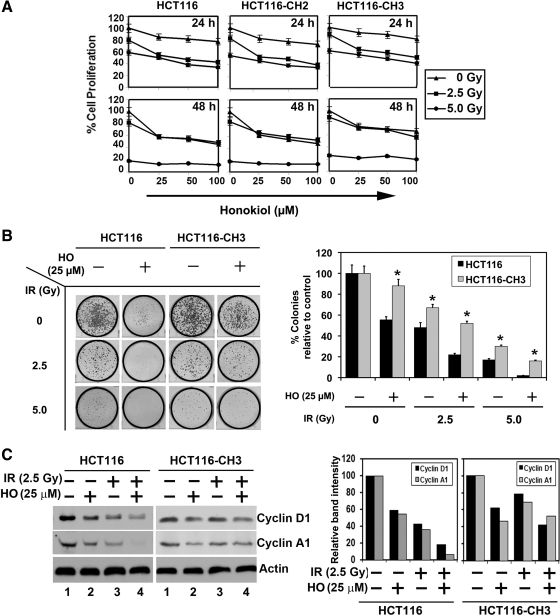Fig. 2.
Mismatch repair status affects the ability of colorectal cancer cell growth against the combination of honokiol and ionizing radiation (IR). A: HCT116, HCT116-CH2, and HCT116-CH3 cells were incubated with increasing doses of honokiol (0–100 μM) and subsequently irradiated with increasing doses (0–5 Gy) of IR. Cell proliferation was determined at 24 and 48 h by use of hexosaminidase enzyme activity. The combination of honokiol with IR resulted in a significant dose- and time-dependent decrease in cell proliferation in all the 3 cell lines compared with untreated controls. Moreover, compared with HCT116-CH3, proliferation effects in HCT116 and HCT116-CH2 were significantly lower (P < 0.017). B: combination of honokiol (HO) and IR inhibits colony formation. HCT116 and HCT116-CH3 cells were incubated with 25 μM honokiol for 24 h and subjected to 2.5 and 5.0 Gy IR. Following this, the cells were allowed to grow and form colonies. Treatment with honokiol and IR inhibited colony formation and showed that additive effect by ANOVA (right). Results are representative of 3 independent experiments. *P < 0.017 for HCT116-CH3 compared with HCT116 cells. C: lysates from HCT116 and HCT116-CH3 cells incubated with 25 μM of honokiol and exposed to 2.5 Gy IR were analyzed by Western blotting for cyclin D1 and cyclin A1. At right, band intensities are plotted compared with control. The combination of honokiol and IR inhibits cyclin D1 and cyclin A1 expression.

